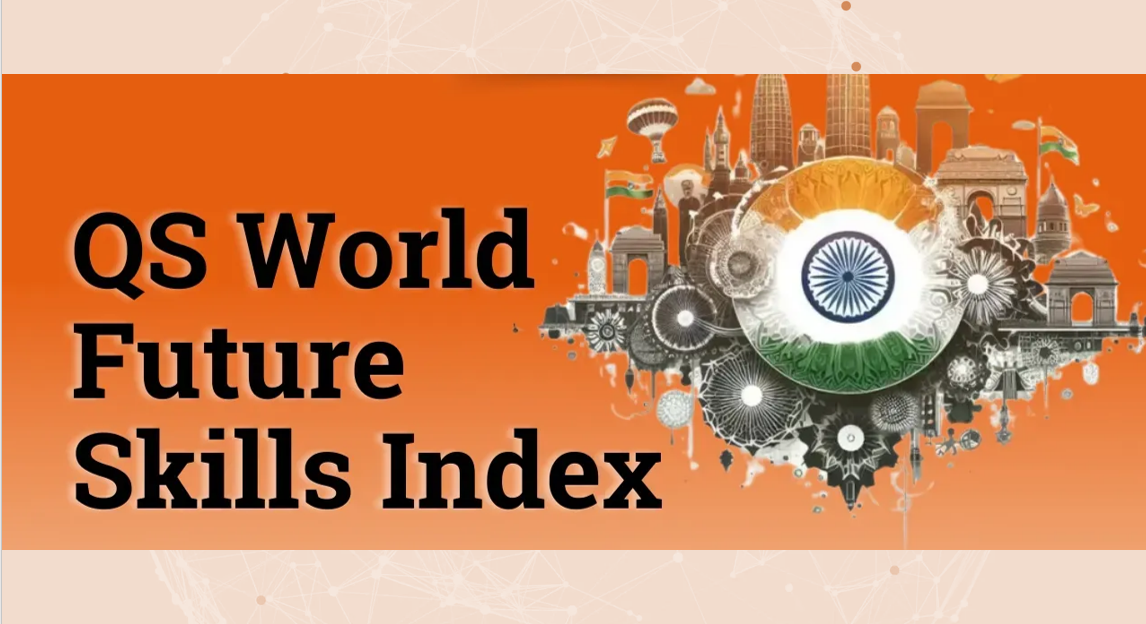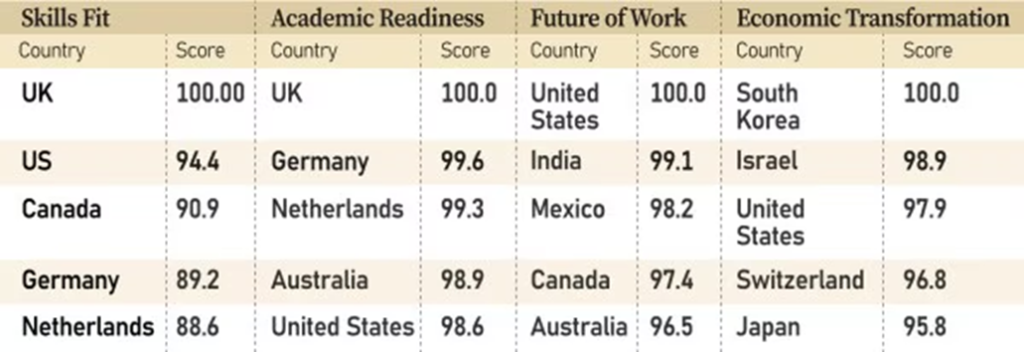India has secured the second position in the QS World Future Skills Index 2025 for its readiness in future job sectors, including artificial intelligence (AI) and green skills, trailing only the United States. However, India’s overall ranking across all indicators is 25th, reflecting gaps in specific areas of economic transformation and workforce skills.
QS World Future Skills Index 2025
Why In News
- India has secured the second position in the QS World Future Skills Index 2025 for its readiness in future job sectors, including artificial intelligence (AI) and green skills, trailing only the United States. However, India’s overall ranking across all indicators is 25th, reflecting gaps in specific areas of economic transformation and workforce skills.
India’s Overall Performance
- India’s overall rank of 25 places it in the “future skills contender” category, while nations like the United States, United Kingdom, Germany, and Canada are designated as “future skills pioneers.” This reflects the need for India to address critical gaps in skills and infrastructure to fully realise its potential in the global job market.
Key Indicators Evaluated – Four Broad Indicators
- QS World Future Skills Index evaluates countries on four broad indicators to determine readiness for future jobs.
- Skills Fit: India scored 59.1, the lowest among the top 30 countries, highlighting a significant gap in the workforce’s ability to meet rapidly evolving job market demands. Employers across India have pointed to a lack of entrepreneurial and innovative mindsets, which limits the ability of graduates to adapt effectively.
- Future of Work: Ranking second globally in this category, India is well-positioned to recruit talent for tomorrow’s jobs, particularly in AI, digital, and green skills. This indicator highlights India’s strength in preparing for technology-driven and sustainable industries, placing it ahead of advanced economies like Germany and Canada.
- Academic Readiness: India scored 89.9 in academic readiness, ranking 26th globally. This measures how well the education system prepares graduates for future workforce requirements. While progress has been made, the alignment between academic curricula and employer needs remains an area for improvement.
- Economic Transformation: India ranked 40th with a score of 58.3, reflecting challenges in sustaining growth and innovation. While the interplay of growth, workforce efficiency, and higher education drives transformation, gaps in investment and innovation capacity pose risks to long-term progress.
Strengths & Weakness
- Strengths:
- Future of Work: Scored 99.1, the second-highest globally, demonstrating its preparedness to recruit talent for high-demand digital roles.
- Youth Advantage: India’s large youth population and robust start-up ecosystem position it uniquely for sustained economic growth.
- Digital Readiness: Alongside Mexico, India is one of the most ready nations to integrate talent into digital roles.
- Weaknesses:
- Future-Oriented Innovation: Scored low on metrics for sustainability and forward-looking solutions.
- Misalignment in Academia and Industry: Gaps in equipping graduates with AI, green, and digital skills remain significant.
- Limited R&D Investment: India’s spending on research and development (0.6% of GDP) lags far behind the global average of 2.7%.
Challenges in Skill Development
- A National Skill Development Corporation (NSDC) study highlights a demand-supply gap of 29 million skilled workers, with demand at 103 million and supply at 74 million. Key sectors like healthcare, semiconductor manufacturing, green jobs, AI, and food processing face acute shortages of skilled professionals.
- According to the World Economic Forum, only 25% of management professionals, 20% of engineers, and 10% of graduates meet employability benchmarks.
- The International Labour Organization (ILO) reports that 47% of Indian workers, including 62% of women, are underqualified for their jobs. India’s vast youth population faces challenges in accessing tertiary education, especially in skills-intensive fields.
Recommendations For Improvement
- Universities and training institutions must focus on delivering skills in AI, green technologies, and digital sectors to meet employer demands.
- Increasing R&D investment is critical to fostering forward-looking innovation and sustainable practices.
- Address regional disparities in tertiary education by creating modular and flexible learning pathways.
- Stronger partnerships between the government, private sector, and academia can drive targeted skilling and innovation.
















